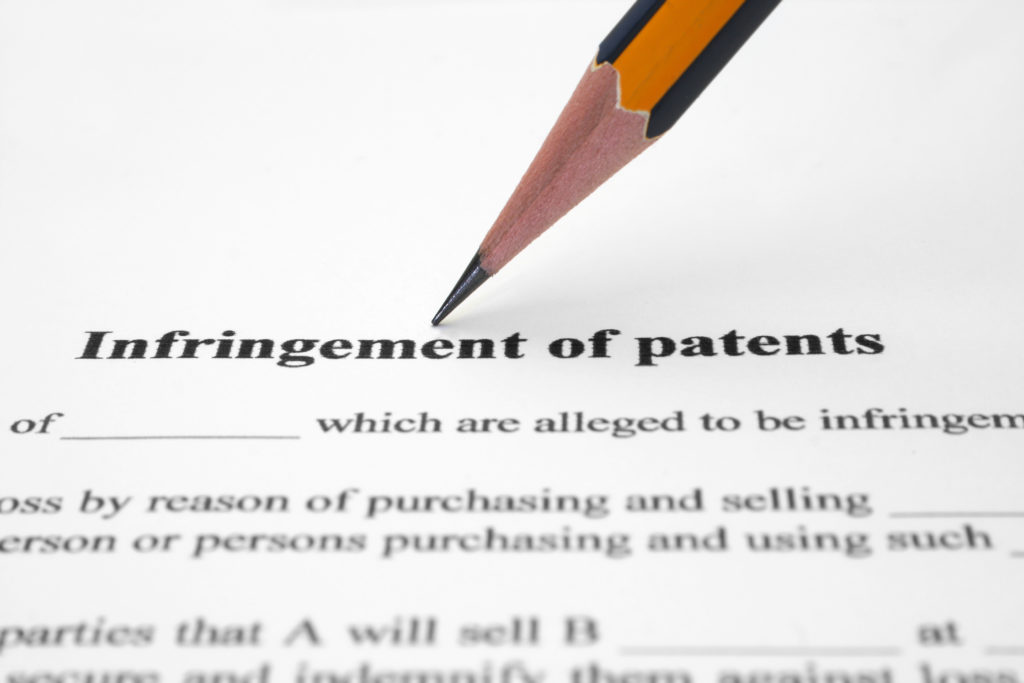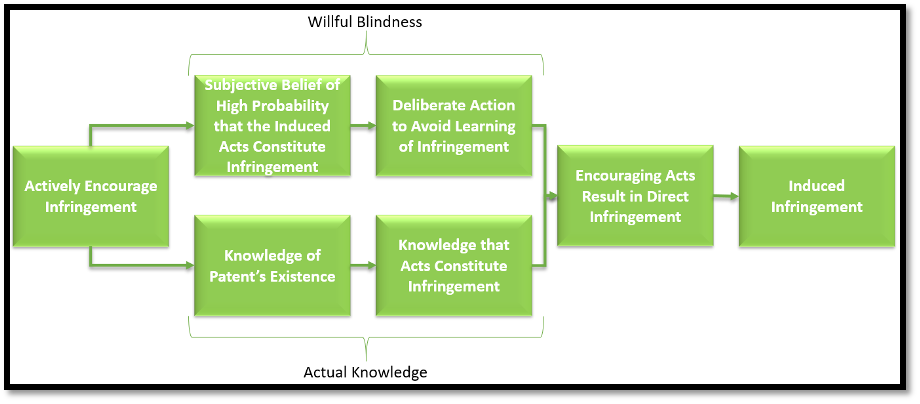“Although Global-Tech has raised the evidentiary standard for induced infringement, the question of whether pre- or post-suit knowledge can establish the knowledge element remains up for debate.”
 To succeed on a claim of induced infringement, a patent owner must show that the accused infringer (1) actively encouraged infringement, (2) knew that the acts they induced constituted patent infringement, and (3) actuated direct patent infringement by those encouraging acts. In many courts, the knowledge requirement can be satisfied by service of a complaint for patent infringement itself. So, the accused infringer can start to incur liability at the onset of litigation. In the minority of courts, only pre-suit knowledge can satisfy the knowledge requirement. In those jurisdictions, the plaintiff must show the accused infringer knew about the alleged infringement before the onset of litigation. The amount of evidence required to show pre-suit knowledge at the pleading phase is an open question.
To succeed on a claim of induced infringement, a patent owner must show that the accused infringer (1) actively encouraged infringement, (2) knew that the acts they induced constituted patent infringement, and (3) actuated direct patent infringement by those encouraging acts. In many courts, the knowledge requirement can be satisfied by service of a complaint for patent infringement itself. So, the accused infringer can start to incur liability at the onset of litigation. In the minority of courts, only pre-suit knowledge can satisfy the knowledge requirement. In those jurisdictions, the plaintiff must show the accused infringer knew about the alleged infringement before the onset of litigation. The amount of evidence required to show pre-suit knowledge at the pleading phase is an open question.
What is Induced Infringement and Where is Knowledge Required?
Under 35 U.S.C. § 271(b), “Whoever actively induces infringement of a patent shall be liable as an infringer.” Prior to the Global-Tech decision in 2011, a patent owner could demonstrate induced infringement by showing that the alleged infringer knew or should have known that their acts would induce infringement. In Global-Tech, an infringing company bought their competitor’s product and copied it, relying on a non-infringement opinion obtained from their patent attorney to attempt to avoid liability for infringement. But the company never told their attorney that they had copied the competitor’s product. The District Court concluded that the company was guilty of inducement under a “known or should have known standard,” and the Federal Court of Appeals affirmed the judgement. While the Supreme Court also affirmed the judgment, the Court took issue with the “should have known” standard.
The Supreme Court concluded that actual knowledge is required to show induced infringement, eliminating the “should have known” alternative. But the Court in Global-Tech went a step further and permitted willful blindness as an alternative to the knowledge requirement. To establish willful blindness, the patent owner must demonstrate that the accused infringer (1) subjectively believed that there was a high probability that the induced acts constituted infringement and (2) took deliberate actions to avoid learning that fact.
Following Global-Tech, some courts questioned whether the knowledge requirement applies to knowledge of the patent’s existence or knowledge that the acts would induce infringement. As the Supreme Court clarified in Commil, the knowledge requirement applies to both.
Below is a flow chart showing the elemental paths to induced infringement in view of these Supreme Court decisions elucidating the standard. The first element requires the alleged infringer to have actively encouraged infringement. In other words, the alleged infringer has taken affirmative steps in bringing about direct infringement by another party. Next, the plaintiff needs to adequately show that the alleged infringer had actual knowledge or willful blindness while the alleged infringer actively encouraged infringement. Lastly, the affirmative steps taken to encourage infringement need to result in direct infringement (usually by another party). Thereby causing damages that would entitle a plaintiff to relief.

Figure: Paths to Induced Infringement
Two Schools of Thought: Pre-suit and Post-suit Knowledge
Depending on jurisdiction and judge, post-suit knowledge of patents and alleged infringement may be enough to maintain a claim for induced infringement, at the pleading phase. In other words, an accused infringer can obtain the knowledge required to show inducement through receipt of a patent infringement complaint against them.
For example, in Wrinkl, Inc. v. Facebook, Inc., Judge Andrews of the District of Delaware contrasted cases with both induced and direct infringement from those with only induced infringement allegations. In the latter, the plaintiff could lose any chance at a patent infringement suit by failing to take pre-litigation action. Judge Andrews weighed the benefits to having parties seek a non-litigation resolution, but found systematically forcing parties to do so unjust.
Judge Andrews distinguished the bad state of mind necessary to prove willful infringement from the mere knowledge of induced infringement. In willfulness cases, unlike induced infringement cases, privilege creates a barrier to evidence that would give the proper insight to the possibility of post-suit bad faith because post-suit activity relies on advice of counsel. While actual knowledge and intent to induce may be inferred from continuing alleged infringement after service of the complaint, litigants operating under advice of counsel may lack the bad faith required to demonstrate willfulness.
In stark contrast, Judge Connolly of the District of Delaware has repeatedly held that an alleged infringer’s post-suit knowledge obtained solely from a patent infringement complaint is not permitted to prove induced infringement, even at the pleading phase. In his view, the complaint is meant to obtain relief for harm that already occurred, rather than create a new claim. Judge Connolly noted in Zapfraud Inc. v. Barracuda Networks that his understanding of the purpose of the complaint is supported by general tort law, where complaints themselves cannot typically establish any element of the cause of action raised in the complaint. He further reasoned that incentivizing parties to seek a non-litigation solution could save the parties and the court money and time because most patent litigations settle anyways.
While the Federal Circuit has not squarely answered the question, some judges (such as a selection of judges within the Western District of Texas and Central District of California) have interpreted the Federal Circuit’s decision in Mentor Graphics Corp. v. EVE-USA, Inc. to implicitly approve post-suit knowledge. In Mentor Graphics, the Federal Circuit addressed concerns of pre-Halo practices, which required a plaintiff to file for a preliminary injunction to bring a claim of post-suit willful infringement. The Federal Circuit found that post-suit willfulness evidence should be considered, even if the plaintiff did not file a preliminary injunction. There, the plaintiff amended the complaint to allege knowledge since the originally filed complaint, but the district court dismissed this amended complaint for failure to state a claim. The Federal Circuit reversed, finding that the complaint met the plausibility standard for stating a claim set out by Twombly. The Federal Circuit was aware that post-suit knowledge was being alleged via the amended complaint but never addressed whether pre-suit or post-suit knowledge met the pleading standard. So, according to some judges, the Federal Circuit implicitly endorsed post-suit induced infringement allegations, based on service of the complaint.
However, given the lack of an explicit endorsement from the Federal Circuit either way, even judges within the same district—such as the Northern District of California and District of Delaware—disagree about whether post-suit knowledge can satisfy the knowledge requirement, leading to unpredictability.
Evidence That May Allow Inference of Knowledge
Global-Tech raised the evidentiary standard for induced infringement by eliminating the “should have known” alternative to knowledge. Because of this raised standard, plaintiffs need enough evidence for the fact finder to infer knowledge or willful blindness. Some evidence may be sufficient on its own, but some may not. Below is a list of evidence that courts have considered:
Service of Complaint – In some jurisdictions, service of the complaint may be sufficient to demonstrate (1) knowledge of the patent and (2) knowledge that the acts will constitute infringement. In other jurisdictions, it may not suffice.
A Letter to the Alleged Infringing Party – Similar to the complaint, a letter to the infringing party may establish the requisite knowledge. However, counsel should be mindful as to exactly what different courts require to be in the letter.
Service of Inter Partes Review (“IPR”) Petition – An IPR petition may be enough on its own for an inference of actual knowledge that the patent existed, but it may not be enough to establish knowledge of infringement.
Cited in Prosecution of Other Patents – Citing the asserted patent during the defendant’s prosecution of a separate patent may be enough to establish knowledge of the patent. But this evidence alone may not be enough to establish knowledge that the acts constitute infringement.
Email with Patent No. Listed – An email sent to the right employee of a company may be enough to establish knowledge, depending on the contents of the email and whether it was acknowledged. In Wrinkl, a Facebook executive allegedly received an email describing the infringing product and patent number. The court found that this sufficiently pled a claim of inducement.
Training, Promotion, Sales, and Importation of the Accused Products – Evidence of training, promotion, sales, importation of accused products, and other surrounding circumstances “taken collectively and in context,” may tip the scales towards an inference of knowledge at the pleading phase.
Within the Family of an Already Known Patent – Knowledge of a patent’s family members and general knowledge of a patent portfolio are typically not enough to establish knowledge.
Copying a Product – Allegations of copying or marking alone may demonstrate willful blindness at the pleading phase.
Knowledge of the Relevant Law – Having awareness of the relevant law could raise the plausibility to willful blindness when accompanied with other evidence. In Global-Tech, when the defendant intentionally copied a product and knew that overseas product usually does not have patent markings, the court found enough evidence for plausibility of knowledge and willful blindness.
Corporate Policy – A policy that prohibits employees from doing patent searches may not be sufficient to establish willful blindness on its own because it may not establish knowledge of infringement.
Competing in the Same Industry – Allegations of general knowledge through industry competition may not be enough on their own, but may tip the scales toward an inference of knowledge, at the pleading phase.
Implications and Takeaways
Although Global-Tech has raised the evidentiary standard for induced infringement, the question of whether pre- or post-suit knowledge can establish the knowledge element remains up for debate. So, while it may be easier to show the actual knowledge required for induced infringement after a formal complaint has been brought against the accused infringer, district courts and individual judges are split as to whether this is permissible. Given this landscape, knowing who knew what, and when, is critical for patent holders and accused infringers alike. In preparing and responding to complaints involving induced infringement allegations—especially where there is no clear evidence of pre-suit knowledge of the patent and infringement allegations, such as an explicit notice letter—counsel should consider (1) whether the judge allows post-suit knowledge to establish the knowledge element of induced infringement, (2) whether induced infringement is the only claim, and (3) what facts allegedly establish the accused infringer’s knowledge of the asserted patent and its alleged infringement.
Image Source: Deposit Photos
Image ID:7365720
Copyright:alexskopje

![[IPWatchdog Logo]](https://ipwatchdog.com/wp-content/themes/IPWatchdog%20-%202023/assets/images/temp/logo-small@2x.png)



![[Advertisement]](https://ipwatchdog.com/wp-content/uploads/2024/04/Artificial-Intelligence-2024-REPLAY-sidebar-700x500-corrected.jpg)
![[Advertisement]](https://ipwatchdog.com/wp-content/uploads/2024/04/UnitedLex-May-2-2024-sidebar-700x500-1.jpg)
![[Advertisement]](https://ipwatchdog.com/wp-content/uploads/2024/04/Patent-Litigation-Masters-2024-sidebar-700x500-1.jpg)

![[Advertisement]](https://ipwatchdog.com/wp-content/uploads/2021/12/WEBINAR-336-x-280-px.png)
![[Advertisement]](https://ipwatchdog.com/wp-content/uploads/2021/12/2021-Patent-Practice-on-Demand-recorded-Feb-2021-336-x-280.jpg)
![[Advertisement]](https://ipwatchdog.com/wp-content/uploads/2021/12/Ad-4-The-Invent-Patent-System™.png)






Join the Discussion
One comment so far.
jeff
August 3, 2022 10:33 amThank you for writing this article!